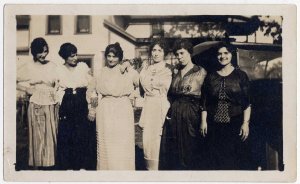Presented By: Institute for the Humanities
FellowSpeak: "Syrian Women's Labor and the Early Arab American Peddling Economy"
Charlotte Albrecht, Richard and Lillian Ives Faculty Fellow, assistant professor, American culture and women’s studies

The little-known Syrian American peddling economy (1870-1955) is an unexpected site for parsing how American perceptions of Arabs have long been rooted in ideas of their sexual and gender difference. After leaving Ottoman Greater Syria, Syrians sold goods across the U.S. while navigating systems of racism that intertwined with gender and sexual norms. Peddling enabled their survival and transformed their family structure. Syrian women participated robustly in the peddling economy and their diverse forms of labor attracted scrutiny, particularly from social welfare reformers. I read the social welfare archive for the associations between transience, transgressions of women’s roles, sexual non-normativity, and Orientalist tropes of difference in order to consider how Syrian women were racialized through their participation in peddling economies. This analysis shows how Syrian women’s peddling practices were directly at odds with notions of white, middle class femininity and thus a threat to some Syrians’ claims of whiteness. This talk also illuminates internal Syrian dynamics of class and its intersections with gender, examining Syrian women both as “clients” of social welfare and as social reformers themselves.
Explore Similar Events
-
Loading Similar Events...
